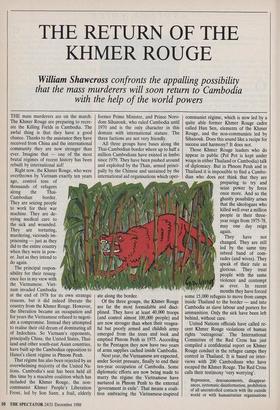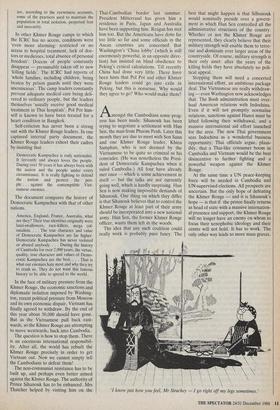THE RETURN OF THE KHMER ROUGE
William Shawcross confronts the appalling possibility
that the mass murderers will soon return to Cambodia with the help of the world powers
THE mass murderers are on the march. The Khmer Rouge are preparing to recre- ate the Killing Fields in Cambodia. The awful thing is that they have a good chance. Thanks to the assistance they have received from China and the international community they are now stronger than ever. Imagine that — one of the most brutal regimes of recent history has been rebuilt by international aid!
along the Thai- Cambodian border. They are seizing people to work for their war machine. They are de- nying medical care to the sick and wounded. They are torturing, murdering, viciously im- prisoning — just as they did to the entire country when they were in pow- er. Just as they intend to do again.
The principal respon- sibility for their resurg- ence lies in my view with the Vietnamese. Viet- nam invaded Cambodia at the end of 1978 for its own strategic reasons, but it did indeed liberate the country from the Khmer Rouge. However, the liberation became an occupation and for years the Vietnamese refused to negoti- ate a compromise. Instead they attempted to realise their old dream of dominating all of Indochina. So Vietnam's opponents, principally China, the United States, Thai- land and other south-east Asian countries, have built up the Cambodian opposition to Hanoi's client regime in Phnom Penh.
That regime has also been rejected by an overwhelming majority of the United Na- tions. Cambodia's seat has been held all this time by a macabre coalition which has included the Khmer Rouge, the non- communist Khmer People's Liberation Front, led by Son Sann, a frail, elderly former Prime Minister, and Prince Noro- dom Sihanouk, who ruled Cambodia until 1970 and is the only character in this domain with international stature. The three factions are not very friendly.
All three groups have bases along the Thai-Cambodian border where up to half a million Cambodians have existed in limbo since 1979. They have been pushed around and exploited by the Thais, armed princi- pally by the Chinese and sustained by the international aid organisations which oper- ate along the border.
Of the three groups, the Khmer Rouge are far the most formidable and disci- plined. They have at least 40,000 troops (and control almost 100,000 people) and are now stronger than when their vengea- ful but poorly armed and childish army emerged from the trees and took and emptied Phnom Penh in 1975. According to the Pentagon they now have two years of arms supplies cached inside Cambodia.
Next year, the Vietnamese are expected, under Soviet pressure, finally to end their ten-year occupation of Cambodia. Some diplomatic efforts are now being made to marry the regime the Vietnamese have nurtured in Phnom Penh to the external 'government in exile'. That means a coali- tion embracing the Vietnamese-inspired communist regime, which is now led by a quite able former Khmer Rouge cadre called Hun Sen, elements of the Khmer Rouge, and the non-communists led by Sihanouk. Does this sound like a recipe for success and harmony? It does not.
United Nations officials have called re- cent Khmer Rouge violations of human rights 'outrageous'. The International Committee of the Red Cross has just compiled a confidential report on Khmer Rouge conduct in the refugee camps they control in Thailand. It is based on inter- views with 200 Cambodians who have escaped the Khmer Rouge. The Red Cross calls their testimony 'very worrying'.
Repression, denouncements, disappear- ances, systematic disinformation, prohibition of all uncontrolled contacts with the outside world or with humanitarian organisations are, according to the eyewitness accounts, some of the practices used to maintain the population in total isolation, perpetual fear and insecurity.
In other Khmer Rouge camps to which the ICRC has no access, conditions were 'even more alarming: restricted or no access to hospital treatment, lack of doc- tors or medicines, total absence of personal freedom'. Dozens of people constantly disappear — presumably taken off to new 'killing fields'. The 1CRC had reports of 'whole families, including children, being beaten by prison guards until they were unconscious'. The camp leaders constantly prevent adequate medical care being deli- vered to ordinary people, but the leaders themselves 'usually receive good medical treatment in Thai hospitals'. Pol Pot him- self is known to have been treated for a heart condition in Bangkok.
Self-criticism has never been a strong suit with the Khmer Rouge leaders. In one captured internal party document, the Khmer Rouge leaders exhort their cadres by insisting that Democratic Kampuchea is truly nationalist. It fervently and always loves the people. During over 50 years it has always been with the nation and the people under every circumstance. It is really fighting to defend the nation and protect the peo- ple . . against the contemptible Viet- namese enemies.
The document compares the history of Democratic Kampuchea with that of other nations.
America, England, France, Australia, what are they? Their true identities originally were land-swallowers, race-killers, mega col- onialists. . . . The true character and value of Democratic Kampuchea are far higher. Democratic Kampuchea has never violated or abused anybody. . . . During the history of Cambodia for over 2,000 years, the virtue, quality, true character and values of Demo- cratic Kampuchea are the best.... That is what our enemies hate most and why they try to crush us. They do not want this famous history to be able to spread to the world.
In the face of military pressure from the Khmer Rouge, the economic sanctions and diplomatic isolation imposed by Washing- ton, recent political pressure from Moscow and its own economic dispair, Vietnam has finally agreed to withdraw. By the end of this year about 50,000 should have gone. But as the Vietnamese pull back east- wards, so the Khmer Rouge are attempting to move westwards, back into Cambodia.
The question is how to stop them. There is an enormous international responsibil- ity. After all, the world has rebuilt the Khmer Rouge precisely in order to get Vietnam out. Now we cannot simply tell the Cambodians to defeat them!
The non-communist resistance has to be built up, and perhaps even better armed against the Khmer Rouge. The authority of Prince Sihanouk has to be enhanced. Mrs Thatcher helped by visiting him on the
Thai-Cambodian border last summer. President Mitterrand has given him a residence in Paris. Japan and Australia have been supporting him. Reagan has met him too. But the Americans have done far too little so far and some officials in the Asean countries are concerned that Washington's 'China lobby' (which is still enormously powerful, in an opposite direc- tion) has insisted on blind obedience to Peking's cynical calculations. Till recently China had done very little. There have been hints that Pol Pot and other Khmer Rouge leaders could go into exile in Peking, but this is nonsense. Why would they agree to go? Who would make them?
Amongst the Cambodians some prog- ress has been made. Sihanouk has been trying to negotiate a settlement with Hun Sen, the man from Phnom Penh. Later this month they are due to meet with Son Sann and one Khmer Rouge leader, Khieu Samphan, who is not deemed by the Vietnamese to be quite so criminal as his comrades. (He was nonetheless the Presi- dent of Democratic Kampuchea when it ruled Cambodia.) All four have already met once — which is some achievement in itself — but the talks are not currently going well, which is hardly surprising. Hun Sen is now making impossible demands of Sihanouk. One thing on which they differ is that Sihanouk believes that to control the Khmer Rouge at least part of their army should be incorporated into a new national army. Hun Sen, the former Khmer Rouge officer, wants them left in the woods.
The idea that any such coalition could really work is probably pure fancy. The best that might happen is that Silhanouk would nominally preside over a govern- ment in which Hun Sen controlled all the administrative structures of the country. Whether or not the Khmer Rouge are represented, they clearly believe that their military strength will enable them to terro- rise and dominate ever larger areas of the countryside. Of course, military strength is their only asset: after the years of the killing fields they have absolutely no poli- tical appeal.
Stopping them will need a concerted international effort, an ambitious package deal. The Vietnamese are really withdraw- ing — even Washington now acknowledges that. The Bush administration must over- haul American relations with Indochina. Even if it will not promptly normalise relations, sanctions against Hanoi must be lifted following their withdrawal, and a massive international aid effort launched for the area. The new Thai government sees Indochina as a wonderful business opportunity; Thai officials argue, plaus- ibly, that a Thai-like consumer boom in Cambodia and Vietnam would be the best disincentive to further fighting and a powerful weapon against the Khmer Rouge.
At the same time a UN peace-keeping force will be needed in Cambodia and UN-supervised elections. All prospects are uncertain. But the only hope of defeating the Khmer Rouge — and it is Sihanouk's hope — is that if the prince finally returns as head of state with a massive internation- al'presence and support, the Khmer Rouge will no longer have an enemy on whom to focus their xenophobic ideology and their centre will not hold. It has to work. The only other way leads to more mass graves.
'I know just how you feel, Mr Strachey — I go right off my legs sometimes.'











































































































 Previous page
Previous page